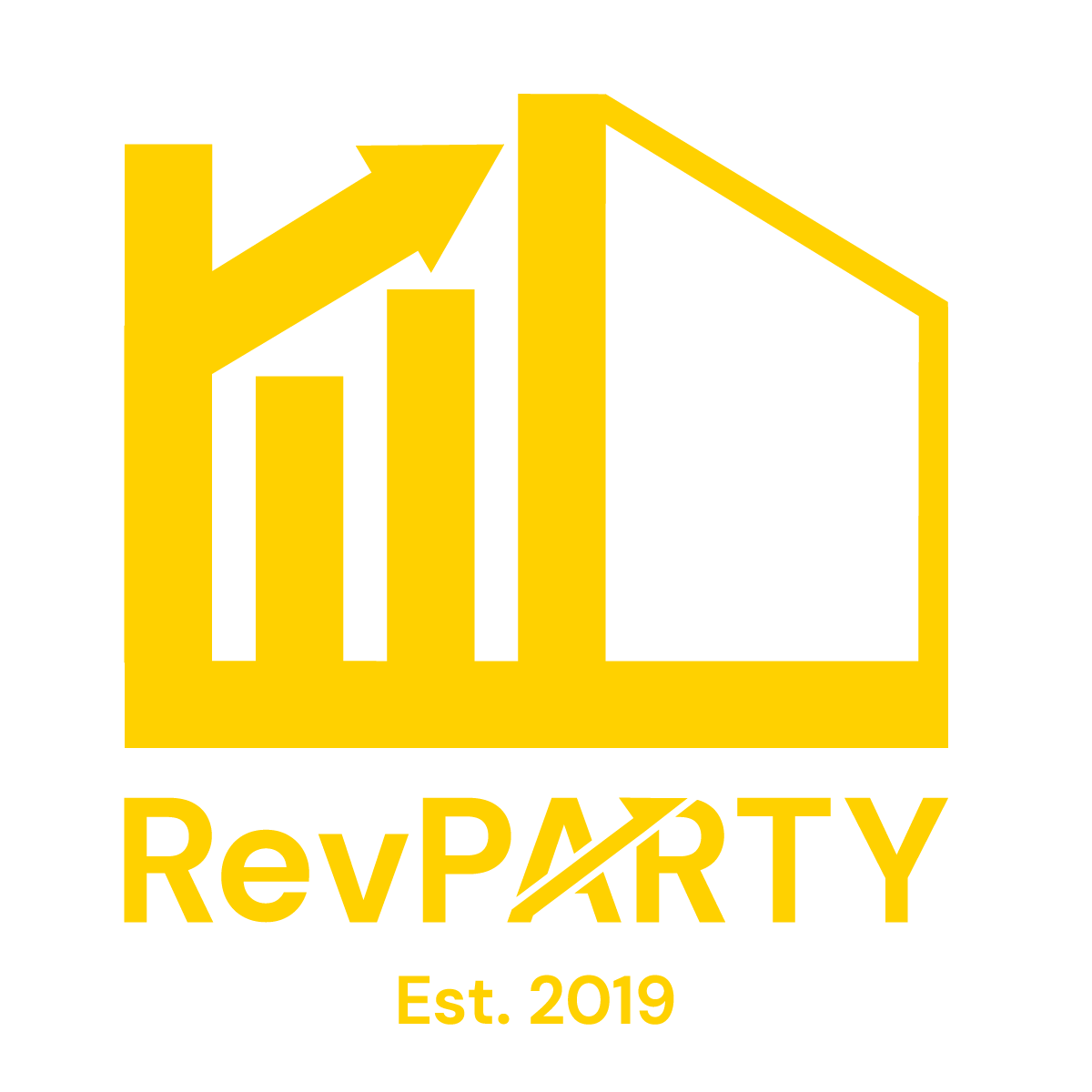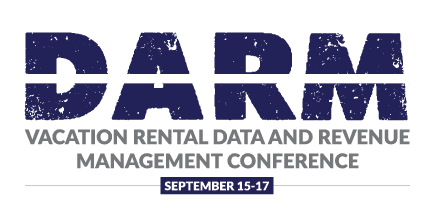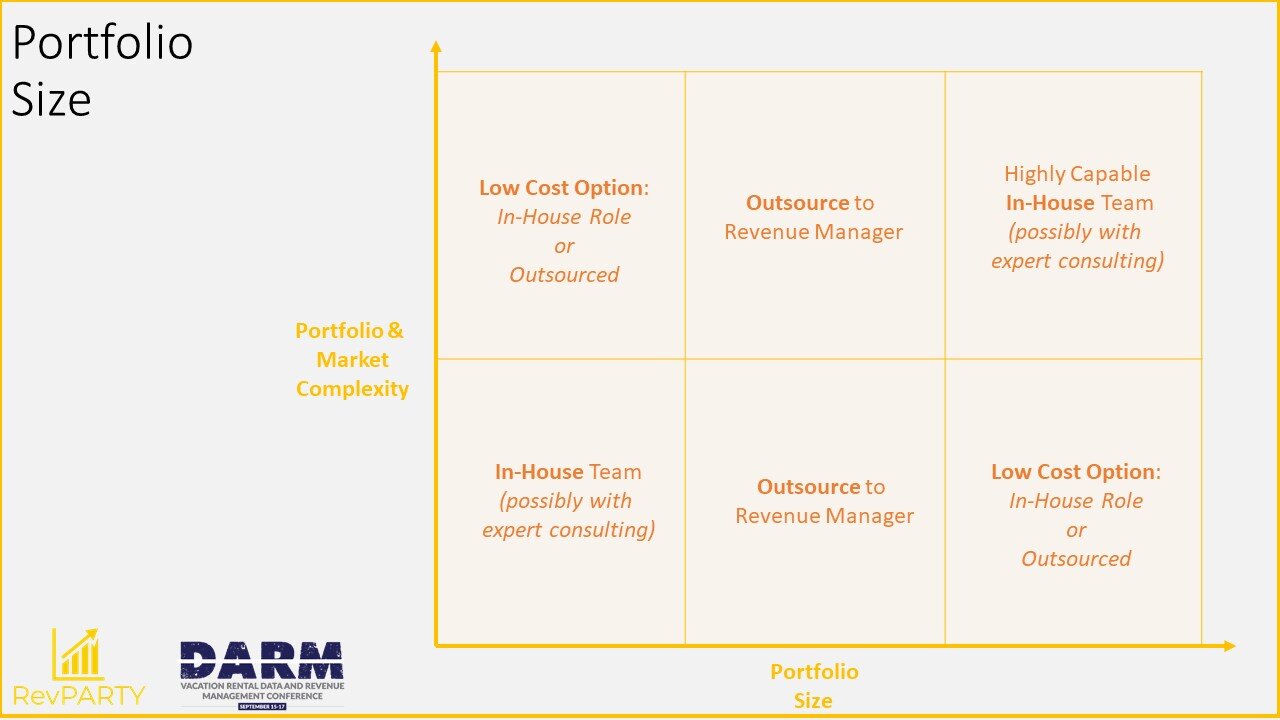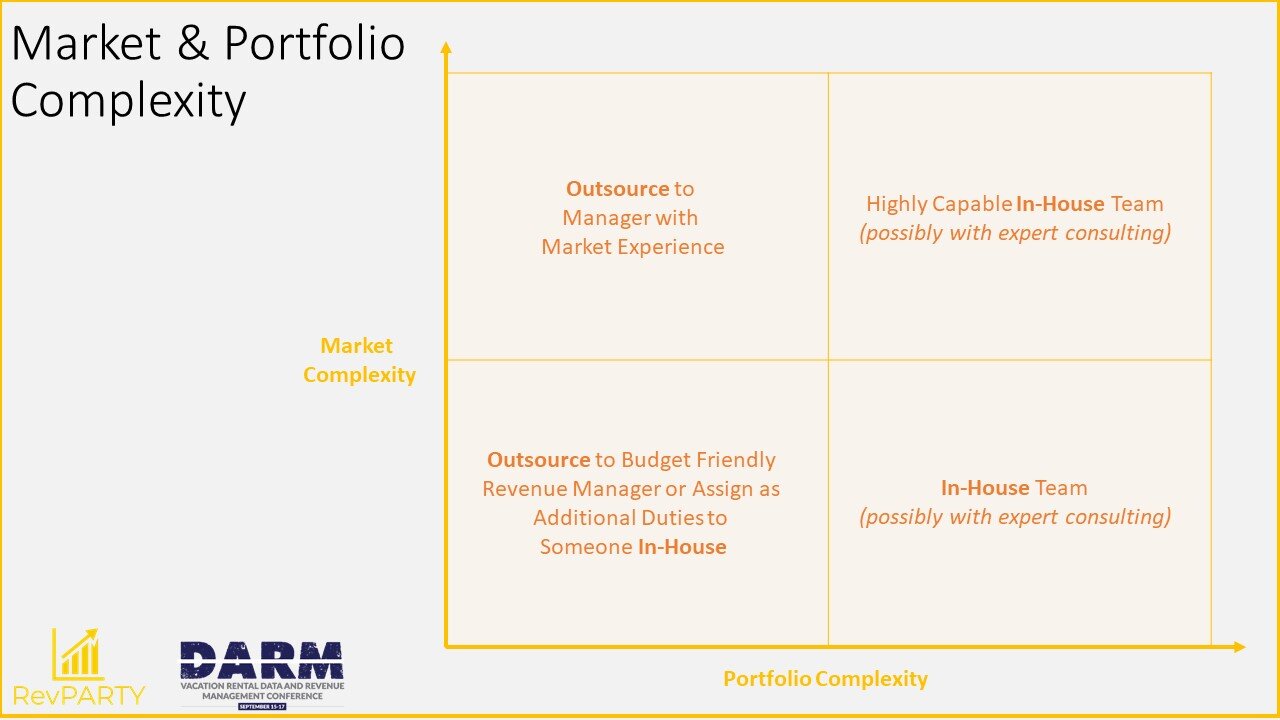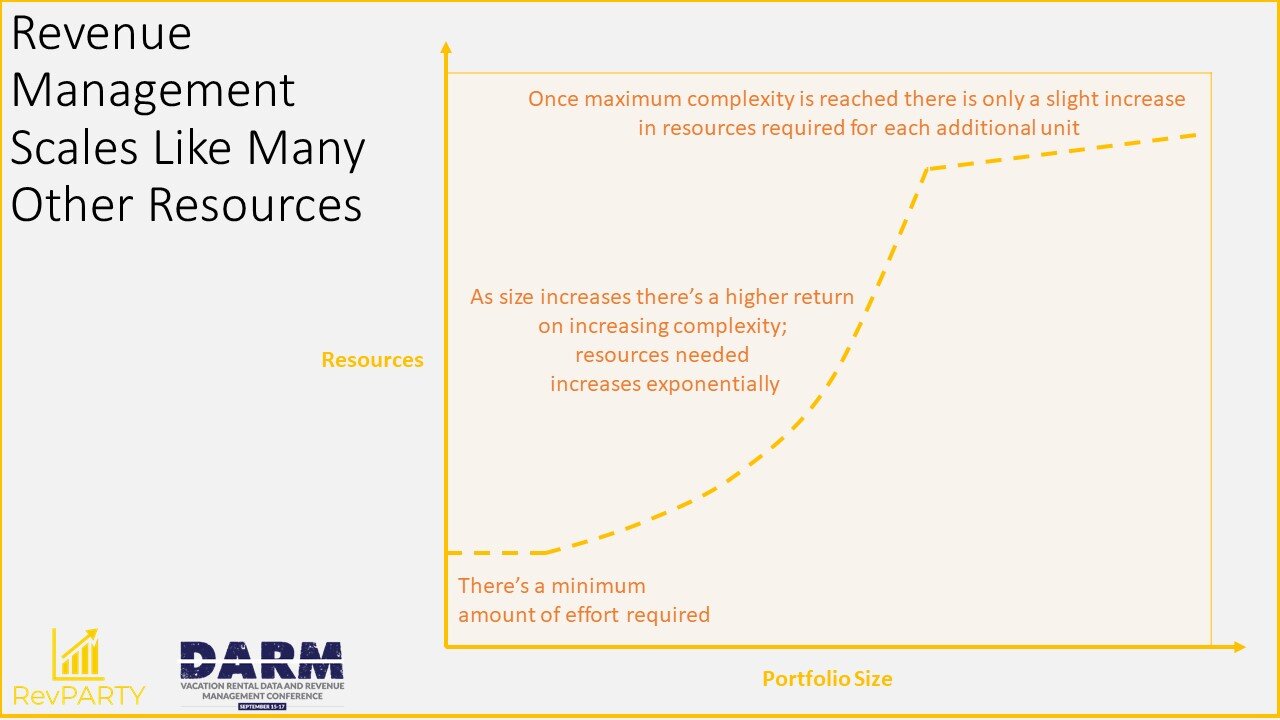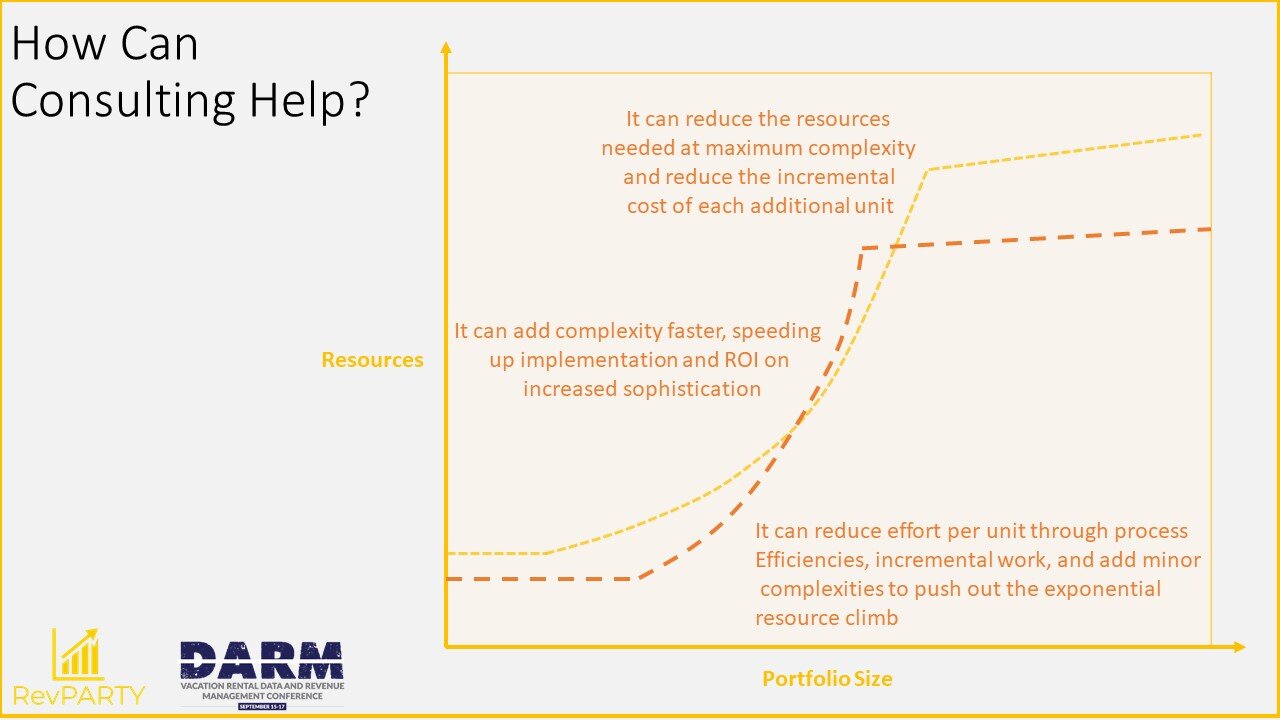There were hurricanes, fires, pandemics, and run-of-the-mill technical difficulties … and we’re talking about DARM, not the apocalypse. While many others took rigorous notes to create sweeping summaries of the conference and its sessions, RevPARTY took note of where we could add value. In this series, we cover topics that may have been missed, concepts that are hard to cover so briefly, and discuss the ideas we wished we had but time did not allow.
At this year’s Vacation Rental Data and Revenue Management Conference, one of the sessions RevPARTY was involved with was a discussion about in-house revenue management solutions and outsourced management solutions. We tried to build a simple 2x2 grid that could easily indicate when in-house solutions were the best fit and when outsourcing revenue management held the advantage. Unfortunately, there’s just too much that goes into it. When and how to outsource or internally develop revenue management capabilities just isn’t a one-size-fits-all answer.
However, there are some general concepts that can help property and portfolio managers decide which solution is right for them. In this article, we’ll dive a bit deeper into why, when, and how to outsource revenue management or create the function in-house. It’s impossible to sum up all the variables into one simple chart but this article should at least give portfolio managers the tools they need to carefully weigh the decision themselves and establish a framework to communicate the benefits to others.
Why Hire a Consultant Anyways?
At RevPARTY, we think there are numerous opportunities for us to contribute to any business and really drive results around our area of expertise: data and revenue management. However, you may be asking a much more simple question, the question before “Why should we hire RevPARTY?” “Why would we even hire a consultant?”
There are some fundamental reasons businesses in all industries hire consultants:
No taxes, benefits or human resource issues
Contract work is scalable
They are temporary, easy to terminate when no longer needed
Independent advice and objective perspective
Can provide a diversity of ideas from other experiences
Flexible for project specific work
Usually a higher-level business professional than may be hired
Serves as a catalyst for change
Identifies problems that those close to the problem can’t see
Can have an extreme level of expertise in a focused area that would be impossible to gain or support from a full-time employee
Its these advantages that largely help determine when an outsourced consultant is a good idea in a company’s or product’s life cycle.
Size Matters … But It’s Complicated
In general, a vacation or short-term rental portfolio’s size can help largely determine whether outsourcing or an in-house hire will have a higher ROI.
When a rental portfolio is small it is unlikely that there is a revenue management expert on staff. However, there’s really not a huge incremental revenue lift from having one. With only a few properties, increasing each by a couple dollars really doesn’t deliver high ROI. Moreover, its really quick to adjust pricing on only a few units and with automated pricing tools becoming more and more prevalent it takes less time than ever. At this size, revenue management is typically kept in-house and assigned as an extra task to someone who has a knack for pricing and data or any person that’s smart enough to kind of “figure it out as they go.”
When the portfolio is growing there’s not many properties and so it is harder to realize returns with incremental improvements. Moreover, there are typically less employees then there is work because costs need to be kept low until the portfolio can support a full staff. So, the employees are likely spread extremely thin with very little free time in the workday. Here it makes sense to outsource the revenue management since it would be hard to realize a return on time or an additional hire with such a small portfolio and a revenue management expert can likely manage and improve a small portfolio with little time and low costs.
Finally, once a portfolio reaches scale revenue management is almost always brought back in house. With such a large portfolio, increasing the revenue from each property by a couple bucks really adds up fast. Also, the amount of work it takes to maintain all of the listings and distribution is enough work to justify a full-time employee. Bringing it back in house allows for cheaper labor and a unique hand on approach to running the portfolio the way the company wants to. Sure, expert consultants are still helpful to improve revenue management processes and capabilities but outsourcing the daily pricing operations is rarely done.
The complexity of the market and the portfolio also influences a company’s ability to outsource or need to keep it in-house. A simple portfolio would have units that are all extremely similar to one another while a complex portfolio would be comprised of many unique snowflakes. Likewise, ski-town markets would be a simple market with its easy to predict seasonal demand while bliesure destinations would be more complex due to the multiple guest segments, seasonality, and events that are independent of one another impacting the entire lodging market. The more complex the market and portfolio then the harder it will be for an employee to take it on as an additional duty.
A complex market and portfolio increases the need for consultants and outsourcing for small to medium sized companies. Once the portfolio is large enough, this complexity makes it beneficial to keep daily pricing and revenue management strategy in-house that’s supplemented with expert level consulting around specific goals and initiatives.
Market Complexity vs. Portfolio Complexity
Not all complexity is created equal and treated all types of complexity the same could produce less than optimal results.
As market complexity increases it becomes harder and harder to casually implement a revenue management strategy without expertise. In simple markets having a “peak season” and a “slow season” can often keep managers on par with the rest of the market. In a simple market, general concepts and casual tracking of a comp set is pretty easy to execute and implement. The insights are easy to interpret.
In complex markets, in order to perform at a level to gain the portfolio’s fair share of market there is simply more variables that interact with one another. In addition to “peak season” demand there may be varying demand for day of the week, different occupancy and unit types, locations within the market, or different guest segments with differing demand at different times. Moreover, these can all interact with each other. For instance, its possible that demand for certain days of the week change during different levels of market demand throughout the year or based on what customer segment is being targeted.
When to outsource based on market complexity is also slightly complex. If complexity is high, then smaller portfolios should look to outsource to revenue managers who have experience in the market. As the portfolio grows it becomes easier to bring that function in house. But market complexity also interacts with portfolio complexity.
If portfolio complexity is low, meaning that the properties are somewhat standard types and there is little variation between the properties within the portfolio, then it is much easier and often cheaper to outsource operational pricing. If a revenue manager is familiar with the market and the portfolio consists of “all standard 1BR properties that are pretty typical for the neighborhood” then its easy for someone not immersed in the details of the portfolio to appropriately price those units. Being a full-time employee of the vacation rental company has little benefit here because the portfolio complexity is low and the properties can be understood and adequately managed with little to no intimate knowledge of the portfolio.
High portfolio complexity makes it extremely difficult to outsource because it isn’t as scalable. For the same reason a vacation rental company would look to outsource the work, the outsourced work is expensive. Every property is different, processes aren’t repeatable, bulk operations or batched work is difficult, any sort of algorithmic improvements take a long time to test and implement and when done have a small ROI on only one unit. Additionally, if the portfolio is complex then it will be hard to find someone with all the necessary experience to easily take on the job.
A complex portfolio often makes revenue management work a better fit for the in-house team. However, it doesn’t mean it will be easy. For the same reasons it’s hard to outsource it’s hard to do well in-house, especially if it’s a new revenue management program or the revenue manager is not experienced. When confronted with an expensive outsourcing option or a cheaper in-house option the latter will normally win, but investing those savings into an expert consulting engagement can help any vacation rental company realize the best of both worlds.
Revenue Management As A Resource
Revenue management is generally a scalable resource. If its conceptualized as a widget or unit of revenue management output, then it acts like many other products and resources. There is a minimum amount of time, effort, and investment to create even the smallest amount of revenue management. At a certain point, additional properties and markets become exponentially expensive to add (which is tied to complexity) and it takes a lot of work before implementation to create a more effective and sophisticated revenue management program. Finally, once process improvements have been made and the model is robust then revenue management becomes an economy of scale and each incremental unit requires negligible additional resources.
A consulting engagement can help any company and in particular revenue management consulting can help adjust this resource curve. Through process improvements, increased and accelerated pricing sophistication, and bringing past experiences to bare, a revenue management consultant can help any vacation rental company scale more quickly and increase any portfolio’s ability to expand not only to more properties but more markets. It’s key to scaling and growth.
Put It All Together
Hopefully, this article was able to provide some real value to the decision making process around outsourcing revenue management or building it in house. If you’ve decided to outsource or just aren’t sure if its right for your company, RevPARTY can help. RevPARTY can help your portfolio gain efficiency, add sophistication, scale quickly, and generate more revenue no matter the portfolio complexity, market complexity, or portfolio size. Our bespoke engagements make sure every job drives real results. Learn more about our revenue management and data analytics consulting services and never hesitate to reach out to RevPARTY.
